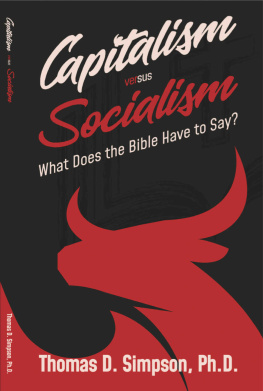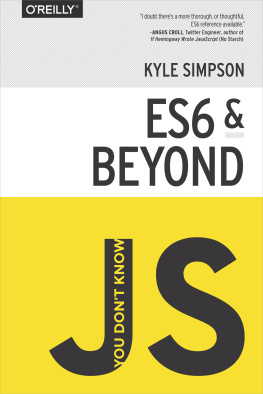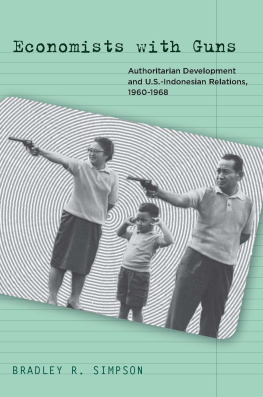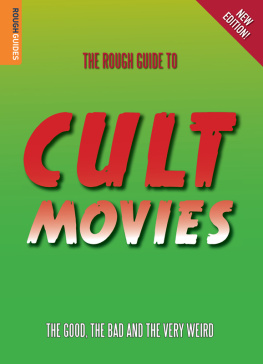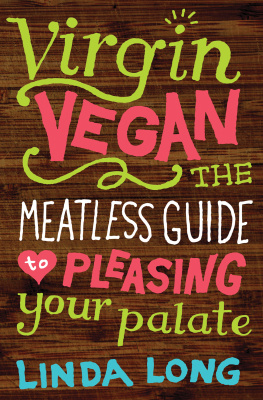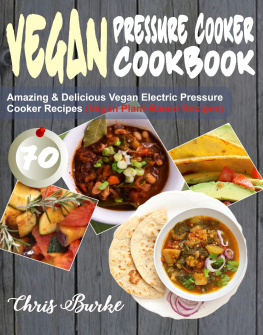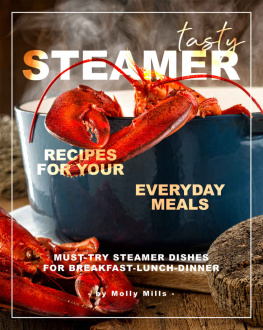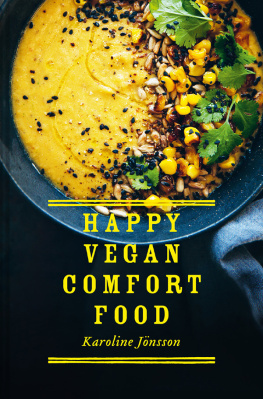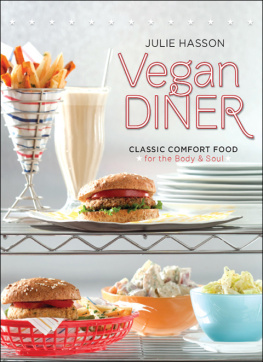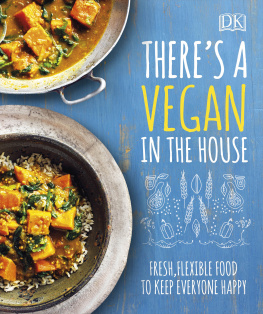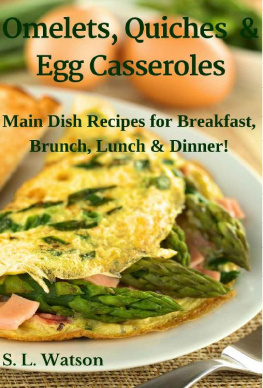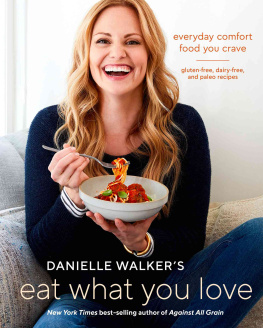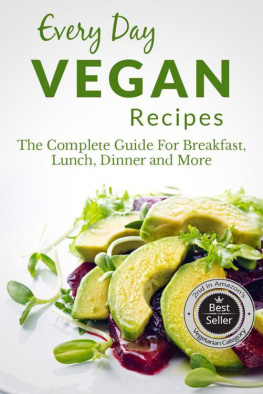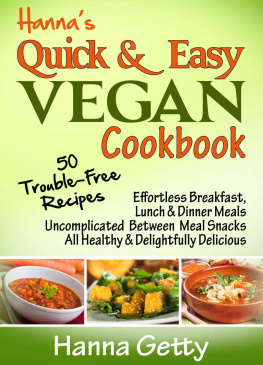W HEN I WAS a kid my secret wish was to be a singer.
My Long Road to Veganism
W HEN I WAS a kid my secret wish was to be a singer.
But I couldnt carry a tune to save my life, so I moved on to more practical goals like being a pediatrician, a veterinarian, or a psychologist. Never in my wildest dreams could I have imagined that I would be sitting down to write my first cookbook, and a vegan cookbook at that. If you look back on my childhood, I suppose all the tell-tale signs were there that that skinny, knock-kneed, energetic, animal-loving little girl would one day grow up to be a passionate vegan cook, but I never saw it coming. You see, I grew up in a house divided. As long as Ive been alive my mother has never eaten pork and, sometime during my early childhood, I decided it would be a good idea for me to drop pork from my diet, too. However, my brother and father held fast to their bacon, ham, and pork chops.
At the age of thirteen, when most kids are doing all they can to fit in and be cool, my girlfriend and I decided to stop eating beef. There was no rhyme or reason to it. She simply turned to me one day and said, I think we should stop eating beef for the summer and see how it goes and I said, I think that will work. I never ate beef again. Seafood was not my thing, so at that point I was down to just chicken and dairy products. My friends and family all told me that I was on track to being a vegetarian but I swore that I would never give up chicken.
I simply couldnt imagine life with no meat at all. Flash forward to 2002, my senior year in college. I was observing Lent and I decided that this year I could think of no greater sacrifice than to give up chicken for forty days and forty nights. I went to the grocery store and armed myself with an arsenal of faux-chicken nuggets, patties, and anything else that even resembled chicken. From the first bite I was hooked. I turned to my roommate and exclaimed, This is better than chicken! Im never going back.
At the end of Lent I found myself eating chicken once again. But something just didnt feel right about it, and by June I was officially a vegetarian. By the age of twenty-one I had moved from my parents home in California to college in Virginia, then to living on my own in Philadelphia. Now that I was a vegetarian people were constantly asking me how strict I was about my diet. I was frequently asked if I was a vegan or if I ever considered going vegan. My answer was always a quick and firm no.
I was starting to become a bit of a cheese snob, dabbling in Gruyre, Brie, Asiago, and Jarlsberg. If it had an unpronounceable name and an unusual texture or taste, I had to try it. It just seemed like a ridiculous notion to give that up. After only a year in Philadelphia I was uprooted to South Carolina, the land of pulled pork, spare ribs, and everything BBQ. The fact that I was a California-born vegetarian meant that I was just one step away from being a one-eyed, one-horned flying purple people eater to the good folks of South Carolina. When it was discovered that I was a vegetarian, the first questions were undoubtedly, So does that mean you dont eat BBQ? No pulled pork? Nothing?! I would shake my head in acknowledgment and they would clutch their pearls or gasp in horror.
South Carolina wasnt exactly vegetarian friendly, and I quickly realized that my old habit of eating out almost every night of the week was not going to work anymore. I bought a bunch of vegetarian and vegan cookbooks and started experimenting. I liked many of the dishes I prepared from these books, but I wasnt able to find that many vegetarian recipes for the foods that I had grown up with and loved. I was born and raised in Fresno, California, which has some of the best Mexican food in the country. Although my mothers roots are in California, my father is from the Deep South of Alabama, so I grew up eating traditional Southern soul food as well. The very first recipe I came up with as a vegetarian was for tacos and my second was for collard greens.
Two recipes led to three, and three to four, and before long, I had a spiral-bound notebook filled with recipes and splotched with food stains. I began to realize that I had the makings of a vegetarian cookbook. After two and a half long years in South Carolina I made my way to Atlanta. By this time I had begun to warm up to the idea of veganism a bit more. Restaurants like Soul Vegetarian and Lovn It Live showed me that vegan food could taste really good, but I still wasnt quite ready to take the plunge. Along the way, I found myself in a juice fasting class taught by Arden Zinn, the founder of a chain of popular juice and smoothie bars in Atlanta called Ardens Garden.
One day she turned to me and said, Why would you consume milk or its by-products? Cows milk is made to grow a calf into a fifteen-hundred-pound cow or bullnot to feed an adult human. Suddenly it all just clicked for me. Out of all the compelling reasons to go vegan, for some reason that one statement did it for me. I quickly went home, tore out all the vegetarian recipes from my growing cookbook, and started working on the book that you are holding in your hands right now Quick and Easy Vegan Comfort Food .
Vegan Myths
T HE TASTE OF cheese isnt the only thing that kept me from taking the leap from vegetarian to vegan. Countless myths swirl around veganism, and I think theres no better time than the present to just get them out of the way.
I acknowledge that it might be a little odd to put vegan myths in a cookbook, but I promise Ill try to find a way to connect all of these to food. The Famous Protein Myth Well-meaning friends and relatives along with most anyone else in the omnivore world will inevitably ask you, Where do you get your protein? If youve only been a vegan or vegetarian for a short time, then this probably hasnt started to bother you yet. But give it time and it will. Heres some information to arm yourself with so that you can sound intelligent when answering that question. A varied and well-balanced diet is the key to getting enough protein. Protein is in almost everything, except sugars and fat.
If you maintain a diet with a wide variety of legumes, grains, nuts, seeds, vegetables, and fruits then you will likely get the protein you need. The chart on page 5 illustrates some of the most concentrated sources of protein. Some notoriously plentiful sources of protein are soy products as well as wheat gluten, also known as seitan. This list is far from complete, so do some research. You will probably discover that most of the foods you already eat are rich in protein.


